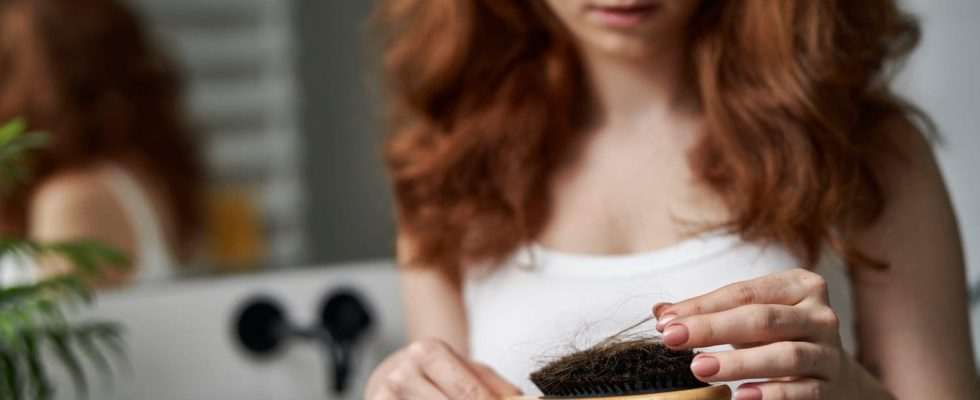The drop in hormones following childbirth can lead to hair loss, sometimes significant in some young mothers. How long does this postpartum alopecia last? Why does hair fall out after baby is born and what can be done to stop this loss of hair mass? We take stock with dermatologist Ségolène Fays-Michel.
During pregnancy, you had lioness hair, and everyone around you complimented you on your hairstyle, supple, silky, shiny and voluminous. But since childbirth, it’s just the opposite! You are losing your hair massively and do not know how to stop this hair loss? So as not to “tear your hair out” (more than that), here are some explanations and advice on the hair loss after childbirthwith the recommendations of Ségolène Fays-Michel, dermatologist.
Why do we have beautiful hair during pregnancy?
The life of a hair has three stages: growth phase called “anagen” (the growth is 1 mm per day and lasts between 3 to 7 years), the phase of activity called “catagen” (the hair stops growing and this period lasts about 3 weeks), and finally the so-called phase “telogen” (the hair dies gradually dislodged and replaced by a new hair. This stage lasts 2 to 3 months).
However, “during pregnancy, these cycles are disrupted because estrogen is then produced in large quantities“ explains dermatologist Ségolène Fays-Michel. These hormones are beneficial to the scalp by increasing the vascularity of the hair bulb. Consequence: the telogen phase is lengthened and hair falls much less than in normal times. Your hair is often more beautiful and abundant during pregnancy. But after pregnancy, and according to women, hair can fall out in quantity…
What are the causes of hair loss after childbirth?
The causes of postpartum alopecia are therefore primarily hormonal. At delivery, the sudden drop in estrogen levels puts an end to this phenomenon and approximately three months later (end of the normal telogen phase), hair begins to fall out profusely.
But hormones aren’t the only cause of hair loss postpartum. Also stack childbirth stress and fatigue the first months of life with your baby. “Stress, whether physical or psychological, causes a desynchronization of the cycle and the sudden transition to the resting phase of the hair, which then begins to fall out” explains Dr. Fays-Michel.
“Stress, whether physical or psychological, causes a desynchronization of the cycle and the sudden transition to the resting phase of the hair, which then begins to fall out”.
How long does postpartum alopecia last?
“Alopecia can last up to 4 months, even 8 months after childbirth in the most serious cases the dermatologist tells us. Remember that hair loss usually occurs three months after the baby is born.
What products and treatments against hair loss after the birth of a baby?
There are three types of treatments against postpartum alopecia. They can be local, oral or hormonal:
Local treatments for hair loss after childbirth
You apply a lotion based on keratin and vitamins of group B (B5, B6, B8) which protects the bulb and solidifies the hair fiber. In addition, massaging the scalp when shampooing also has a stimulating effect on hair growth, taking care not to rub it so as not to sensitize the already weakened hair.
Oral treatments for hair loss after childbirth
A treatment based on trace elements can also help to overcome any mineral and vitamin deficiencies. They are generally based on vitamins A, B, E, zinc and magnesium, and participate in the formation and strengthening of hair keratin. However, some food supplements are not recommended when breastfeeding, you should seek the advice of your doctor or pharmacist.
Hormonal treatments for hair loss after baby
A treatment will be prescribed in case of persistent hormonal imbalance diagnosed by a specialist.
What to do in case of severe hair loss after the birth of a baby?
This postpartum alopecia can pass on its own, however “if the hair loss persists beyond 4 months, it is better to make an appointment with your doctor who will prescribe a treatment” advise the dermatologist. It is also best to consult if this hair loss worries you, if it lasts beyond 4 to 5 months or if you notice a decrease in the density of your hair.
All young mothers are faced with the decrease in estrogen, in fact, hair loss is almost inevitable. However, “it can vary in intensity depending on the woman, sometimes going so far as to affect 30% of the hair mass” notes Dr. Fays-Michel.
Also, to limit the intensity or/and the duration of this postpartum alopecia, the dermatologist suggests, in addition to the treatments if necessary, to encourage the young mother to take care of herself, to allow herself some time to relax, to unwind and to adopt a balanced and varied diet.
Thanks to dermatologist Ségolène Fays-Michel.
